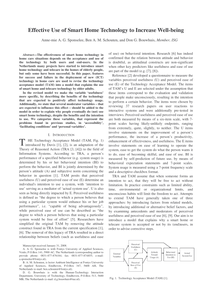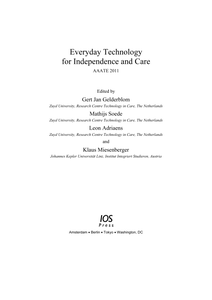Over the last two decades, institutions for higher education such as universities and colleges have rapidly expanded and as a result have experienced profound changes in processes of research and organization. However, the rapid expansion and change has fuelled concerns about issues such as educators' technology professional development. Despite the educational value of emerging technologies in schools, the introduction has not yet enjoyed much success. Effective use of information and communication technologies requires a substantial change in pedagogical practice. Traditional training and learning approaches cannot cope with the rising demand on educators to make use of innovative technologies in their teaching. As a result, educational institutions as well as the public are more and more aware of the need for adequate technology professional development. The focus of this paper is to look at action research as a qualitative research methodology for studying technology professional development in HE in order to improve teaching and learning with ICTs at the tertiary level. The data discussed in this paper have been drawn from a cross institutional setting at Fontys University of Applied Sciences, The Netherlands. The data were collected and analysed according to a qualitative approach.
DOCUMENT

Purpose: This is a position paper describing the elements of an international framework for assistive techhnology provision that could guide the development of policies, systems and service delivery procedures across the world. It describes general requirements, quality criteria and possible approaches that may help to enhance the accessibility of affordable and high quality assistive technology solutions. Materials and methods: The paper is based on the experience of the authors, an analysis of the existing literature and the inputs from many colleagues in the field of assistive technology provision. It includes the results of discussions of an earlier version of the paper during an international conference on the topic in August 2017. Results and conclusion: The paper ends with the recommendation to develop an international standard for assistive technology provision. Such a standard can have a major impact on the accessibility of AT for people with disabilities. The paper outlines some the key elements to be included in a standard.
DOCUMENT

Teacher knowledge guides a teacher's behaviour in the classroom. Teacher knowledge for technology education is generally assumed to play an important role in affecting pupils' learning in technology. There are an abundant number of teacher knowledge models that visualise different domains of teacher knowledge, but clear empirical evidence on how these domains interact is lacking. Insights into the interaction of teacher knowledge domains could be useful for teacher training. In this study, the hypothesised relations between different domains of teacher knowledge for technology education in primary schools were empirically investigated. Subject matter knowledge, pedagogical content knowledge, attitude, and self-efficacy were measured with tests and questionnaires. Results from a path analysis showed that subject matter knowledge is an important prerequisite for both pedagogical content knowledge and self-efficacy. Subsequently, teachers' self-efficacy was found to have a strong influence on teachers' attitude towards technology. Based on the findings in this study, it is recommended that teacher training should first of all focus on the development of teachers' subject matter knowledge and pedagogical content knowledge. This knowledge will positively affect teachers' confidence in teaching and, in turn, their attitude towards the subject. More confidence in technology teaching and a more positive attitude are expected to increase the frequency of technology education, which consequently increases teaching experience and thereby stimulates the development of teachers' pedagogical content knowledge. This circle of positive reinforcement will eventually contribute to the quality of technology education in primary schools.
LINK
Purpose - Focusing on management training, this study aimed to establish whether identical elements in a training program (i.e. aspects resembling participants' work situation) can improve training transfer and whether they do so beyond the contribution of two well-established predictors -- motivation to learn and expected utility. In an effort to establish mechanisms connecting identical elements with training transfer, we proposed and tested motivation to transfer as a mediator. Design/methodology/approach - Data were collected online from 595 general managers who participated in a management training program. Structural equations modeling was used to test the model. Findings - Identical elements, expected utility and motivation to learn each had a unique contribution to the prediction of training transfer. Whereas motivation to learn partly mediated these relationships, identical elements and expected utility also showed direct associations with training transfer. Research limitations/implications - Identical elements represent a relevant predictor of training transfer. In future research, a longitudinal analysis from different perspectives would be useful to better understand the process of training transfer. Practical implications - Participants may profit more from management training programs when the training better resembles participants' work situation. Organisations and trainers should therefore apply the concept of identical elements in their trainings, in order to increase its value and impact. Originality/value - This study contributes to the training literature by showing the relevance of identical elements for transfer, over and above established predictors.
DOCUMENT

Advanced technology is a primary solution for the shortage of care professionals and increasing demand for care, and thus acceptance of such technology is paramount. This study investigates factors that increase use of advanced technology during elderly care, focusing on current use of advanced technology, factors that influence its use, and care professionals’ experiences with the use. This study uses a mixed-method design. Logfiles were used (longitudinal design) to determine current use of advanced technology, questionnaires assessed which factors increase such use, and in-depth interviews were administered to retrieve care professionals’ experiences. Findings suggest that 73% of care professionals use advanced technology, such as camera monitoring, and consult clients’ records electronically. Six of nine hypotheses tested in this study were supported, with correlations strongest between performance expectancy and attitudes toward use, attitudes toward use and satisfaction, and effort expectancy and performance expectancy. Suggested improvements for advanced technology include expanding client information, adding report functionality, solving log-in problems, and increasing speed. Moreover, the quickest way to increase acceptance is by improving performance expectancy. Care professionals scored performance expectancy of advanced technology lowest, though it had the strongest effect on attitudes toward the technology.
DOCUMENT

Athlete development depends on many factors that need to be balanced by the coach. The amount of data collected grows with the development of sensor technology. To make data-informed decisions for training prescription of their athletes, coaches could be supported by feedback through a coach dashboard. The aim of this paper is to describe the design of a coach dashboard based on scientific knowledge, user requirements, and (sensor) data to support decision making of coaches for athlete development in cyclic sports. The design process involved collaboration with coaches, embedded scientists, researchers, and IT professionals. A classic design thinking process was used to structure the research activities in five phases: empathise, define, ideate, prototype, and test phases. To understand the user requirements of coaches, a survey (n = 38), interviews (n = 8) and focus-group sessions (n = 4) were held. Design principles were adopted into mock-ups, prototypes, and the final coach dashboard. Designing a coach dashboard using the co-operative research design helped to gain deep insights into the specific user requirements of coaches in their daily training practice. Integrating these requirements, scientific knowledge, and functionalities in the final coach dashboard allows the coach to make data-informed decisions on training prescription and optimise athlete development.
DOCUMENT

Among runners, there is a high drop-out rate due to injuries and loss of motivation. These runners often lack personalized guidance and support. While there is much potential for sports apps to act as (e-)coaches to help these runners to avoid injuries, set goals, and maintain good intentions, most available running apps primarily focus on persuasive design features like monitoring, they offer few or no features that support personalized guidance (e.g., personalized training schemes). Therefore, we give a detailed description of the working mechanism of Inspirun e-Coach app and on how this app uses a personalized coaching approach with automatic adaptation of training schemes based on biofeedback and GPS-data. We also share insights into how end-users experience this working mechanism. The primary conclusion of this study is that the working mechanism (if provided with accurate data) automatically adapts training sessions to the runners’ physical workload and stimulates runners’ goal perception, motivation, and experienced personalization. With this mechanism, we attempted to make optimal use of the potential of wearable technology to support the large group of novice or less experienced runners and that by providing insight in our working mechanisms, it can be applied in other technologies, wearables, and types of sports.
DOCUMENT

This paper reports on the EU-project 'Professionally Networking Education and Teacher Training' (PRONETT). The key objective of the PRONETT project (2001-2004) is to develop a regional and cross national learning community of pre- and in-service teachers and teacher educators supported by webbased resources and tools to collaborate and to construct shared understandings of teaching and learning in a networked classroom. The reasons for the initiative and the design principles of the PRONETT portal offering a virtual infrastructure for the collaboration of participating students and teachers at www.PRONETT.org are presented. The initial pilots carried out by the project partners are described, highlighting the co-ordinating partners activities targeted at contributing to the local realisation of ICT-rich, competence based Teacher Education Provision. Results are reported of the evaluation and implementation efforts aimed at validating the original portal design and collecting information to inspire further project development and implementation strategies. We conclude by summarising the lessons learned and providing recommendations for improved and extended use and further dissemination of the project results and facilities.
DOCUMENT

The effectiveness of smart home technology in home care situations depends on the acceptance and use of the technology by both users and end-users. In the Netherlands many projects have started to introduce smart home technology and telecare in the homes of elderly people, but only some have been successful. In this paper, features for success and failure in the deployment of new (ICT) technology in home care are used to revise the technology acceptance model (TAM) into a model that explains the use of smart home and telecare technology by older adults. In the revised model we make the variable 'usefulness' more specific, by describing the benefits of the technology that are expected to positively affect technology usage. Additionally, we state that several moderator variables - that are expected to influence this effect - should be added to the model in order to explain why people eventually do (not) use smart home technology, despite the benefits and the intention to use. We categorize these variables, that represent the problems found in previous studies, in 'accessibility', 'facilitating conditions' and 'personal variables'.
DOCUMENT

Transitions in health care and the increasing pace at which technological innovations emerge, have led to new professional approach at the crossroads of health care and technology. In order to adequately deal with these transition processes and challenges before future professionals access the labour market, Fontys University of Applied Sciences is in a transition to combining education with interdisciplinary practice-based research. Fontys UAS is launching a new centre of expertise in Health Care and Technology, which is a new approach compared to existing educational structures. The new centre is presented as an example of how new initiatives in the field of education and research at the intersection of care and technology can be shaped.
DOCUMENT
